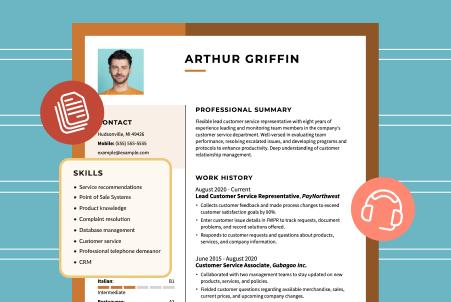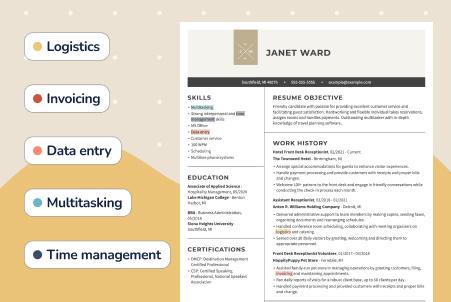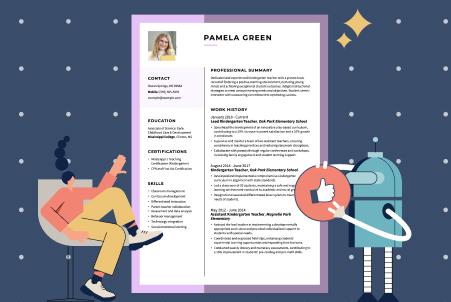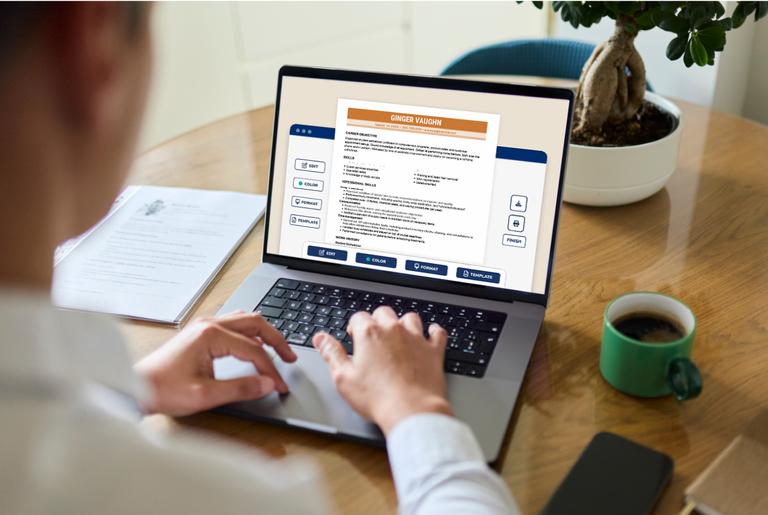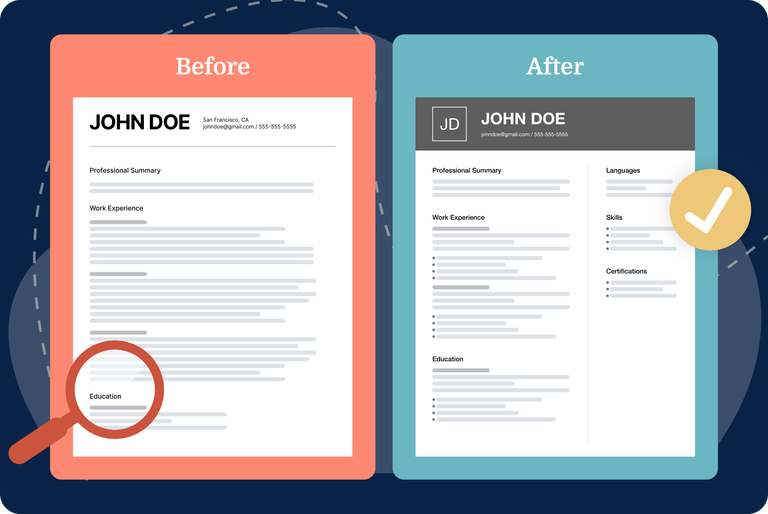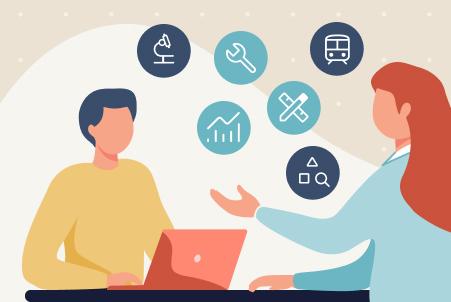Customer Service Skills: Examples & Tips for Your Resume

Our customers have been hired at: *Foot Note
Table of Contents
Get started with MyPerfectResume today!
- Build a resume on any device
- Pick an ATS-friendly template
- Tailor with AI copy suggestions
Happy customers tend to be repeat customers. That’s why customer service work is at the core of business success. From addressing customer inquiries and resolving complaints to processing orders and providing information, customer service professionals are pivotal in ensuring customer satisfaction and loyalty. In this guide, you’ll learn the top customer service skills to add to your resume and how to develop them to advance your career. Read our guide, How to Write a Resume, to learn how to effectively add customer service skills to your resume.
What are customer service skills?
Customer service skills include various abilities crucial for effective customer interaction, including soft skills like communication and technical skills like CRM software proficiency. Customer service professionals use these skills to facilitate smooth customer experiences, address issues, and maintain customer satisfaction. Strong customer service skills are essential for managing customer interactions, handling tasks efficiently, and contributing to a business's success.
Here's an example of a resume with customer service skills:
More customer service resume examples
Explore our library of resume examples for more ideas on adding customer service skills to your resume, or discover more customer service resume examples by job title, below.
- Customer Service Job Resume Examples and Templates
- Customer Service Student Resume Examples and Templates
- Customer Service Agent Cover Letter Example & Templates
- Customer Service Manager CV Examples & Templates
- Customer Service Assistant Manager Resume Examples & Templates
Examples of customer service skills
We’ve curated a list of various skills used for customer service tasks in the workplace. Highlight any of the skills below if they pertain to you and match the responsibilities of the job description in your resume. We recommend using a resume template to easily add your customer service skills to each section.
Hard skills
Customer service tasks often require specific, measurable abilities and knowledge that can be honed through learning and practice. These hard skills for customer service are essential for ensuring positive customer interactions within an organization.
Examples of hard customer service skills include:
- Product knowledge
- Order processing
- Technical troubleshooting
- Payment processing
- CRM software proficiency
- Data entry
- Inventory management
- Complaint handling
- Upselling and cross-selling
- Multilingual proficiency
Soft skills
Soft skills are vital to customer service because they facilitate effective communication, relationship building, and problem resolution.
Here are 10 essential soft customer service skills:
- Empathy
- Patience
- Active listening
- Emotional intelligence
- Persuasion
- Positivity
- Resilience
- Cultural sensitivity
- Customer advocacy
- Creativity
Transferable skills
Transferable skills are invaluable in customer service roles because they can be applied across various industries and enable professionals to adapt to diverse environments and challenges.
Here are ten important transferable customer service skills:
- Communication
- Problem-solving
- Time management
- Adaptability
- Teamwork
- Critical thinking
- Leadership
- Organization
- Conflict resolution
- Decision making
Technical skills
Technical skills are crucial to customer service jobs because they enable professionals to efficiently utilize software programs for customer management, communication and task organization. Proficiency in technical skills ensures that customer service tasks are executed accurately and expediently in today's digital work environment.
Examples include:
- CRM Software proficiency
- Email management and etiquette
- Live chat software
- Telephony systems
- Social media management tools
- Help desk software
- Knowledge base software
- E-commerce platforms
- Data analysis and reporting
- Technical troubleshooting
How to improve your customer service skills
Improving customer service skills involves continuous training and development to refine techniques and enhance customer interactions.
Consider the following strategies and tactics to improve your customer service skills:
- Continuous training and development: Provide ongoing training sessions to employees focused on enhancing customer service techniques, handling difficult situations and utilizing new tools or software.
- Feedback and performance reviews: Regularly review customer feedback and conduct performance evaluations to identify strengths and areas for improvement. Based on these reviews, provide constructive feedback and coaching to employees.
- Role-playing and simulations: Conduct role-playing exercises and simulations to practice different customer service scenarios. This helps employees build confidence and improve their response times and problem-solving skills.
- Customer feedback loop: Establish a system to collect customer feedback after interactions. Use this feedback to identify trends and areas for improvement and to recognize exceptional service. Encourage frontline employees to seek feedback and implement improvements actively.
- Empowerment and autonomy: Empower frontline employees to make decisions and resolve issues independently when appropriate. Provide guidelines and clear boundaries to ensure consistency while allowing flexibility to meet customer needs.
- Cross-functional collaboration: Foster collaboration between customer service teams and other departments, such as sales, marketing and product development. This helps employees understand the business and its offerings holistically, enabling them to provide more informed and effective customer service
How to highlight customer service skills on your resume
When writing a resume for a customer service job, it is essential to highlight job-relevant customer service skills to stand out in today’s competitive job market.
Below are some key strategies to ensure your customer service abilities shine on your resume.
Start with the best professional resume format for your work experience and career goals.
Choose a resume template that clearly and professionally showcases your customer service skills.
Customize your customer service skills, experiences and achievements to match the job description.
Include two to five pertinent customer service skills in your resume summary.
Create a category for your customer service skills in your resume skills section.
Emphasize your measurable customer service achievements in your work history section.
Common tools used by customer service professionals
Customer service professionals commonly use many different tools and technologies to succeed in their roles.
Ten common tools and technologies for customer service include:
- Customer relationship management (CRM) software: Manages customer information, interactions and support tickets.
- Help desk ticketing systems: Platforms for logging, tracking and resolving customer issues efficiently.
- Live chat software: Enables real-time communication with customers via text chat on websites or apps.
- Telephony systems: Tools such as VoIP and traditional phone systems for handling customer calls.
- Email management tools: Software for managing large customer emails effectively.
- Social media management platforms: Used to monitor and respond to customer inquiries and feedback on social media channels.
- Knowledge base software: Provides self-service options for customers to find answers to common questions.
- Remote desktop software: Allows customer service agents to access and troubleshoot customers' computers remotely.
- Survey and feedback tools: Platforms for collecting customer feedback and measuring satisfaction.
- Analytics and reporting tools: Used to analyze customer service metrics, trends and performance to improve service quality.
Best customer service certifications
Certifications in customer service can enhance your skills, increase your job opportunities and eventually lead to promotions or higher pay.
- Certified Customer Service Professional (CCSP)
- Customer Experience Management (CEM)
- Certified Contact Center Professional (CCCP)
- Certified Customer Experience Professional (CCXP)
- Salesforce Certified Service Cloud Consultant
Key takeaways
- Customer service is foundational to business success and includes tasks like resolving complaints and enhancing customer satisfaction and loyalty.
- Essential customer service skills range from technical proficiency (such as CRM software and data analysis) to soft skills (such as empathy and resilience).
- Continuous training and development are crucial for improving customer service skills, including role-playing exercises and feedback loops to refine techniques.
- Highlighting customer service skills in your resume involves tailoring your skills and experiences to the job description using measurable achievements to demonstrate your capabilities.
- Common tools and technologies for customer service professionals include CRM software, help desk ticketing systems, live chat software, telephony systems and social media management platforms.
Our customers have been hired at:*Foot Note
